With northern Italy cut off from the outside world because of corona and looking increasingly desolate, we are reminded of an interview we had a few years ago with writer Davide Longo about his book The vertical man. A book à la The Road by Cormac McCarthy, in which Longo outlines a desolate world that has changed drastically as a result of an outside event. What exactly happened and where is not made entirely clear - a disease, another disaster - but in any case, the people who are still there have to survive in a barren and barren environment.
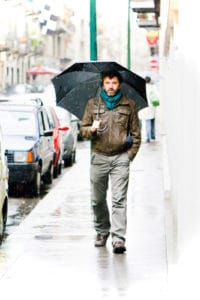
On a rainy day in Turin....
The economy is not the only thing that is in turmoil; the Italian weather has also been off the rails for weeks. On a day when it would normally be bright weather in Turin, rain lashes the pavement and the mountains surrounding the capital of the province of Piedmont have hidden in mist. A perfect setting to interview Davide Longo, author of the penetrating, ominous novel The vertical man. At the kitchen table in his flat, near the banks of the Po, he narrates, thoughtfully and with pauses.
Right of the strongest
The vertical man is set in an inexorably harsh Europe. Prosperity has disappeared and justice has been supplanted by the law of the jungle. However, protagonist Leonardo's life had been declared bankrupt years before. Adultery with a student destroyed his career as a writer and university lecturer, as well as his marriage and family life: his wife left, taking their daughter with her.
Since then, Leonardo has lived withdrawn in a small Italian village, where he finds peace amid his books. Friends he has few, but in a puppy he saves from death, he finds a companion. He names the animal Bauschan, after a dog in one of Thomas Mann's stories.
However, he cannot stay entrenched for long; raw reality knocks inexorably on his door. Leonardo's ex-wife is on the doorstep with their daughter Lucia and Alberto, a son from her second marriage. Her husband has not returned from abroad and she wants to leave her children temporarily (at least, that is the intention) with Leonardo, to go looking for him. But when she too does not return and the aggressive gangs looting the country get closer and closer, Leonardo, like many other villagers, flees with his dog, children and the non-speaking help Salomon.

Hell tour
The hellish journey that awaits the company makes the hair stand on end. However much Leonardo tries, he is unable to protect his loved ones from the rampant evil, nor himself. They fall into the hands of a group of ruthless youths, led by a certain Richard, who, under the influence of narcotics, pushes his gang to the most heinous excesses. Helplessly, Leonardo must watch as Richard appropriates his daughter, locked up like a circus performer in a wagon, together with the elephant David (a brilliant supporting role, by the way), the only creature with whom he finds affection. Cursing his fear and lack of courage, Leonardo eventually gets to the point where he shows what he is worth.
Courage
Although set against a European background, the book tells a universal story of survival and values in a world on fire. 'I wanted to explore a certain form of courage through Leonardo, a different form from what an earlier novel was about; that was a more traditional, epic form of bravery, heroism. You probably spend most of this book thinking that Leonardo is not brave at all - he doubts it himself. But then he discovers another form of bravery: one where it is not about nullifying violence, but about not being touched by it. All around him there is violence and old values are decaying, but Leonardo manages to maintain a certain innocence that allows him to survive.'
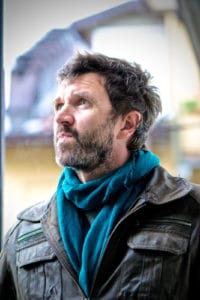
Morality
Courage is a subject that has occupied Longo's mind for a long time and that he looks at from ever new angles. His characters face a choice between doing what is right and what serves self-interest best. At the sharp end, showing courage or lack thereof determines the course of action. 'You have to make such choices in everyday life too, especially in Italy. In this country you have to choose every day between being honest, doing the right thing, and gaining advantages by doing what is just not quite legal or morally just not quite right. And you have to be prepared to bear the consequences of that choice. If you are a righteous and just person - not even a saint or anything, but just someone who thinks about moral issues - you are quite alone in Italy; more alone than in other countries, I notice when I am in Germany or the Netherlands, for example. In Italy, you have to choose very early in life which path you want to take. And every day you have to re-sign that contract, reconsider your position. A lot of energy is lost with that. It is a major reason why so much is not going well here.'
Mediocrity has acquired a negative connotation in this country of extremes, Longo sighs. 'Italy is a country that produces many heroes, you find excellence alongside the worst of the worst. One of the tenets within Latin philosophy was in media stat virtus, or in other words: the middle way, balance, produces the best results. In Italy, that middle ground is hard to find. Therein lies at the same time the attraction to others, I think: it seems as if life here is more intense and the sexual energy greater.'
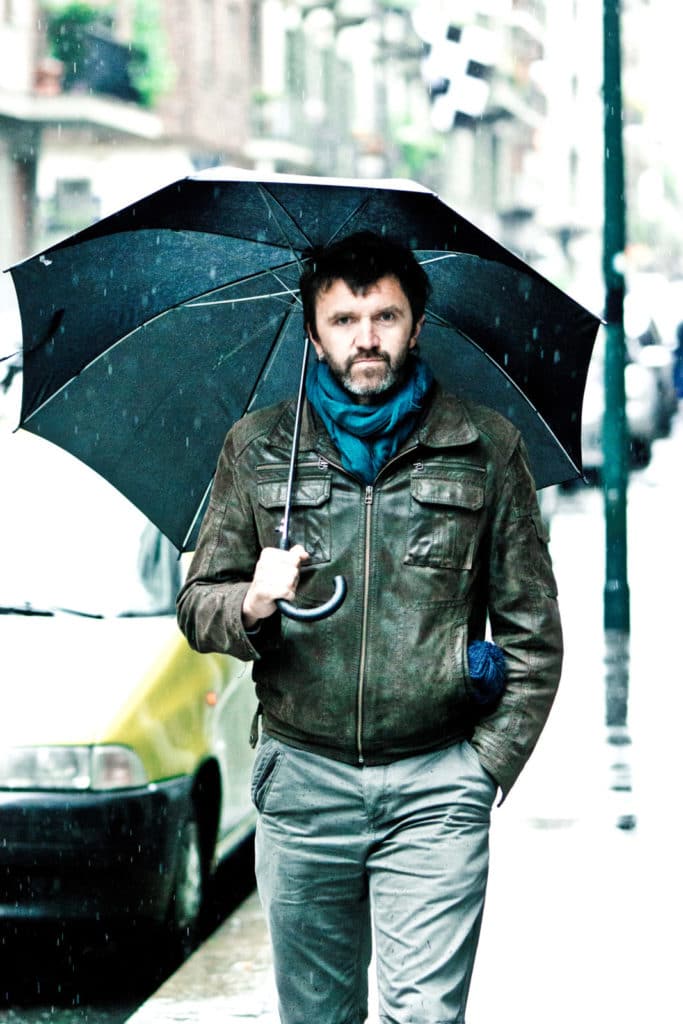
Decay
Davide Longo, however, sees above all a society in a state of decay, and outlines in The vertical man a disconcerting picture of what this could mean in the longer term. For how much humanity is left when people feel threatened in their own existence? What will be left of civilisation if prosperity disappears and people become dependent on themselves and each other for food, help or care?
'In Italy, you can see it in the mess there is politically, but also in art. Only films and books are still being produced that have pure entertainment as their purpose, not to make you think or discuss, or if necessary just complain. They no longer have anything to say, whereas in films from Azerbaijan, for instance, where they hardly have a budget, that need to express and denounce things is palpable. Civilisations are like an organism: there is a period of growth and development and then, at some point, decay sets in. You can bear that fate with dignity, by not sitting around complaining about everything that is deteriorating, but staying active and looking to the future. But my country is like an old man, reveling in a beautiful past and unable to look forward.'
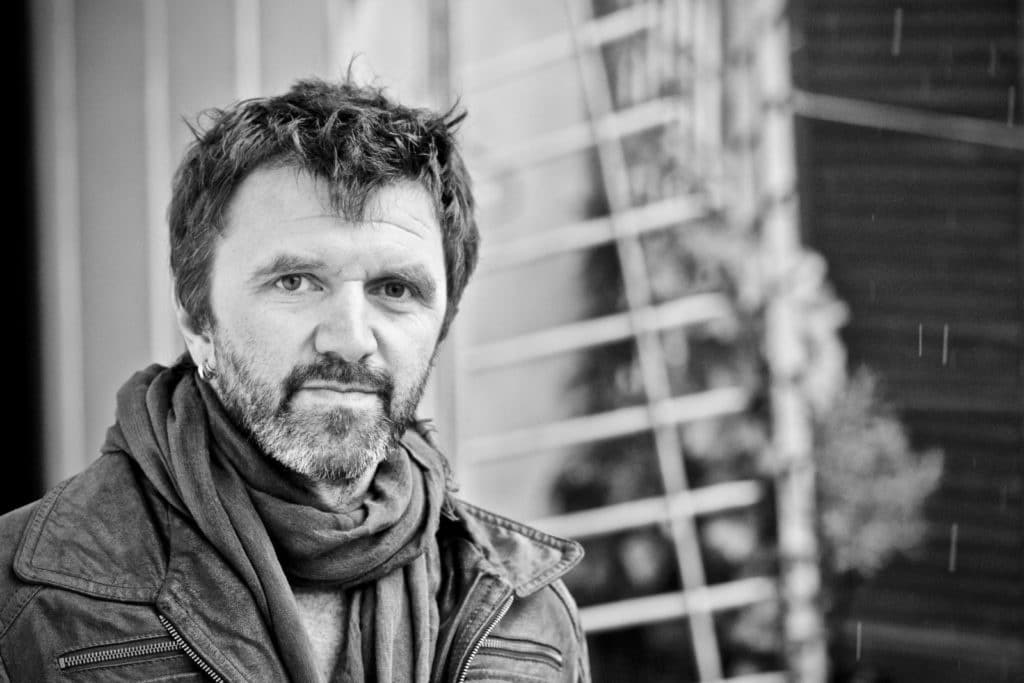
No fantasy
Whether it will really get as bad as in his novel - Longo hopes not, of course. On the other hand, the world he outlines may not even be as far away from us as we would like it to be, for instance if the European Union broke up. 'When the 1984 Winter Olympics were held in Sarajevo, Yugoslavia was considered a paragon of ethnic integration. If you had asked anyone then whether civil war might break out there, everyone would have said: no, such things happen in Africa, among primitive peoples, but not here. Seven years later, there was a war going on. And the former Yugoslavia borders Italy, so why couldn't something like that happen here too? Everything I describe in my book does happen somewhere in this world. That's why I don't consider it fantasy either.'
Speaking of fantasy - at one point in the book, Leonardo chops off his fingers to regain his own freedom and that of his daughter. 'At a festival, I met an editor who said, "You copied that scene from Fosco Maraini, didn't you?"' Turned out that in his biography he described being imprisoned in a Japanese internment camp, where the Italian families were not getting enough food from the Japanese. He went to the prison warden and cut off his finger with a knife. The warden was so impressed by this that he started treating the Italian prisoners with more respect and also allowed them to provide more food. I didn't know that story at all! I just want to say: you make something up, but there is always someone who can tell you that what you made up really took place.'
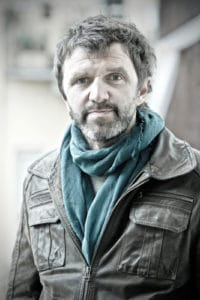
Collapse
A book that Longo, in writing The vertical man did have in his mind was The Road by Cormac McCarthy, one of his favourite authors. 'However, there is an important difference between his book and mine, and that is that I describe a very different kind of collapse of a civilisation than he does. McCarthy presents a fairly traditional picture of the apocalypse: the earth is hit by a meteorite, a nuclear war, a pandemic. My book is about a much slower collapse of society. In history, many civilisations have disappeared, but that was a process of a few centuries rather than a few years. The cause is almost always intrinsic, although there is a temptation to shift the blame and responsibility onto someone else: onto another country or people, or immigrants.'
When it really comes down to it, who can save themselves? Leonardo wonders if he will be able to take care of the children, now that he is forced to leave his safe book world. "Now his body was that of a man of fifty-two, who devoted his life to books, intellectual reflections and to dialogue. Things that had less and less use in the world that was unfolding before his eyes."
Survival
'The book reflects on the role of writers and other intellectual professions in society. For a writer, the temptation can be to live in a kind of parallel world. Leonardo has withdrawn himself and has little connection to reality; he lives in a world of paper. But then he suddenly comes face to face with a world far more brutal than the one he had fled. I myself grew up in the countryside, so I am used to using my hands. I spend a lot of time in the mountains and they teach you the distinction between nature and civilisation like no other. But sometimes I wonder: if the world loses its laws, if we really face a lot of violence, what happens then? If tomorrow the power goes out and you have to scavenge something to eat, will you be able to build a fire and prepare food without matches?'
Longo laughs: 'Books are useful for that: after reading Jack London, for example, you know that the bark of the birch is much better for starting a fire than paper.'
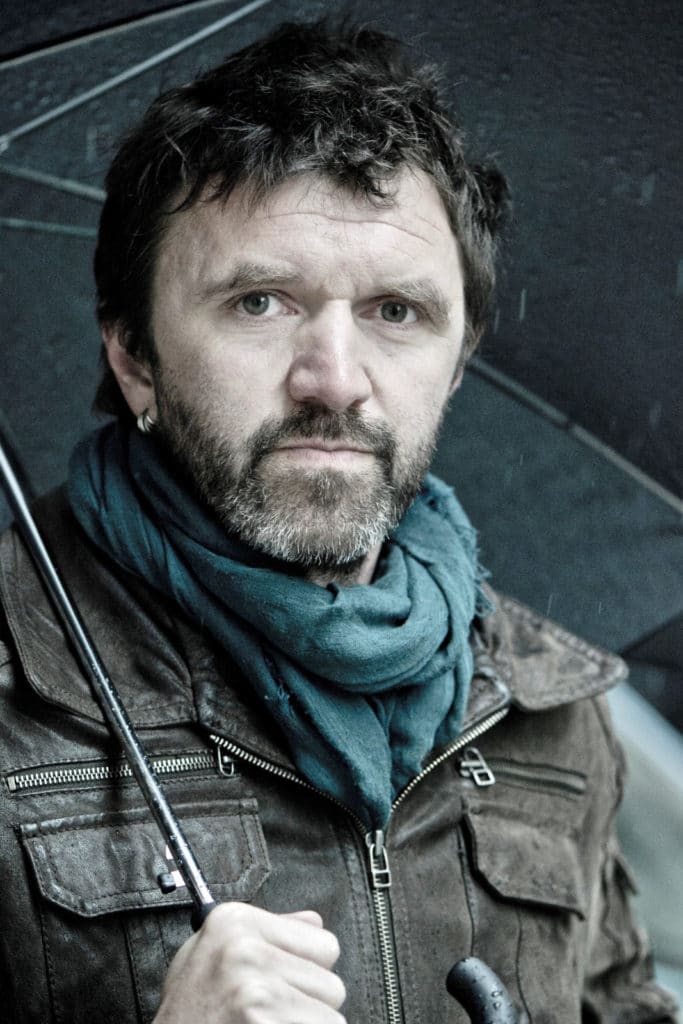
Stories
Leonardo leaves literature behind, but does eventually return to the primal form of writing: storytelling. 'As such a type of writer I also consider myself: artisanal, traditional, using history to transform it into an epic appropriate to our times. It sometimes starts like a running race: there are several stories, one starts off energetically but quickly falls back and eventually abandons the race, while the other gets off to a slow start, small and with short legs but with great stamina, eventually winning the race. That story becomes your story and you become the trainer; every day you let it run, whip it, let it rest again for a while.
The most difficult period is when the story is already in my head but I'm still thinking it out: that's when I identify with the characters and the story can really make me suffer. Once I start the writing process, I concentrate only on the actual writing of the story, just like a surgeon concentrates on the surgical operations; he is also not busy sympathising with the patient at that time. So while writing, you use your pain and suffering, as you would if when you are cooking. Then they are the ingredients for a good dish.'
The vertical man by Davide Longo (translation Pieter van der Drift) was published by De Geus.
